Trying to stand out in a crowded marketplace can be a daunting prospect. But with the right bit of help, solopreneurs, small businesses, and startups can soar above a landscape teeming with rivals. That’s where smart search engine optimization (SEO) tools come in.
Solopreneurs and small teams face many of the same problems — from trying to stretch money and time budgets further, to the challenge of developing technical sophistication with limited resources. The best SEO tools solve a lot of these problems by automating tasks and reporting, helping content show up in AI answers to search questions (AEO), scaling marketing strategies that work for the specific business, and identifying unique opportunities that brands can pursue without extensive marketing knowledge.
For example, keyword research tools uncover what target audiences are searching for, so even businesses in niche areas can optimize content to be a perfect fit for their customers. SEO tools can also analyze user behavior with heat maps or bounce rates to reveal where the friction points are on a website.
Furthermore, A/B testing tools and SEO-driven content analysis can improve everything from calls to action on blog posts to landing page designs, with the goal of improving conversion rates. In short, SEO tools turn guesswork into strategy, allowing solopreneurs to grow visibility, drive traffic, and convert leads — all while staying lean and agile in a competitive digital space.
But that’s only true if you’ve got the right tools in hand, which is why we compared the major SEO tools to see which were the best for solopreneurs and small businesses looking for growth.

The best all-purpose SEO tool
An all-purpose SEO tool consolidates essential functions into a single, cohesive platform. Instead of juggling multiple individual tools for different SEO tasks, an all-in-one solution streamlines workflows and boosts efficiency — something that matters even more for small teams and solopreneurs.
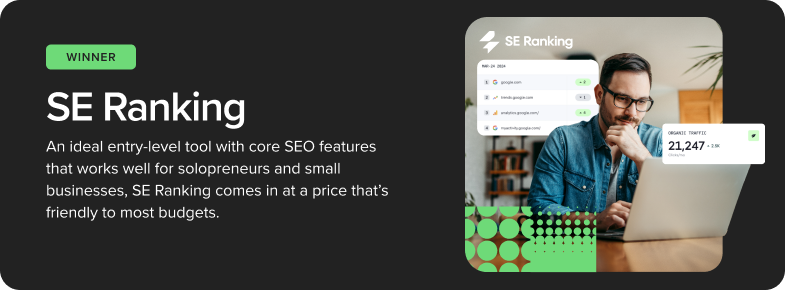
Tier we reviewed: 14-day trial; Essential plan $44/month

Overall verdict
SE Ranking delivers consistently strong performance across all categories we tested — and at $44 per month for the Essential Plan, it’s accessible to most solo operators and small teams. It includes robust functionality like tracking up to 750 keywords, auditing up to 100,000 pages, and running detailed competitor research — all without the higher price tags typical of premium tools. And if you want to level up, the Pro Plan still comes in at just $87 per month.

Tier we reviewed: 7-day trial; Pro plan starting at $140 /month

Overall verdict
SEMRush earns the runner-up spot thanks to its depth, polish, and exceptional feature range — including robust keyword research, competitive analysis, and AI capabilities. However, it falls just short of SE Ranking for solopreneurs and small teams due to its steeper learning curve, higher cost, and occasional gating of essential features behind more advanced tiers. It’s an ideal choice for those ready to scale or with technical know-how in-house, but may be overkill for leaner teams seeking simplicity and immediate ROI.
*Factoring in Usability, Budget, Testing Results, and Aggregate Review Rating scores
The best SEO tools for keyword research
The best SEO tools for keyword research offer insight into the terms potential customers are searching for online. This lets even small teams without dedicated SEO experts create optimized content that ranks, ultimately delivering more leads and sales.
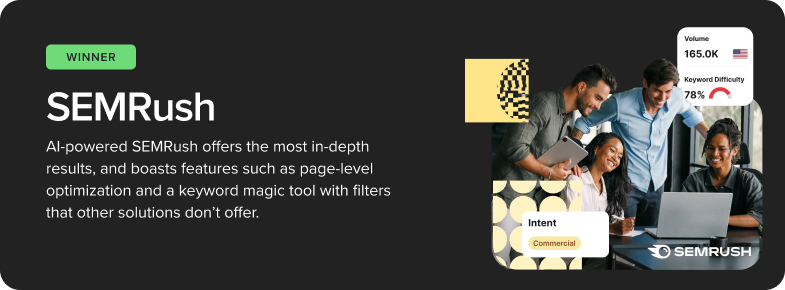
Tier we reviewed: 7-day trial; Pro plan starting at $140 /month

Overall verdict
The keyword research section in SEMrush is one of the most thorough across user groups. The overview section offers keyword ideas, related questions, and a keyword strategy broken down into topic clusters, top keyword opportunities for your domain, and a builder tool based on your site’s seed keywords. And search engine results page (SERP) analysis can be used to track and break down organic results and your site’s potential for ranking in the top 100 positions.

Tier we reviewed: No free trial or tier, paid starts at $39/month

Overall verdict
SpyFu doesn’t offer domain-specific keyword research like SEMrush, but provides useful metrics such as monthly search volume (MSV), estimated clicks, organic ranking history, and related keywords and questions. It also includes a keyword-specific backlink section and analyzes ranking organic results. However, its inclusion of extensive ad-related data and lack of AI SERP insights may limit its usefulness for purely SEO-focused work.
The best SEO tools for rank tracking
Insights from SEO rank tracking are essential to a data-driven approach for small businesses because they allow teams to assess how effective SEO efforts are, optimize content for specific keywords, and track progress against competitors. They empower more informed decisions and improve your brand’s online presence.
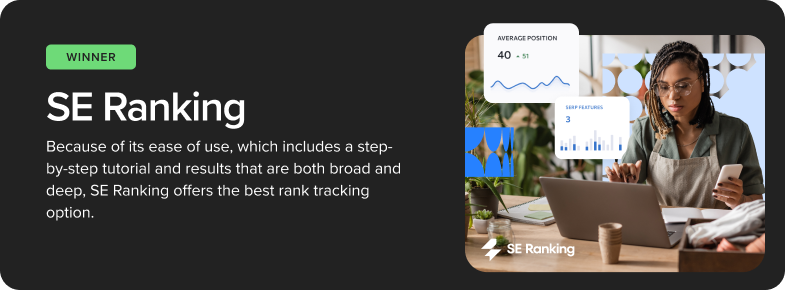
Tier we reviewed: 14 day trial; starts at $65/month

Overall verdict
The robust ranking overview section offers a wide range of information, including keywords in top position distributions, search visibility percentage, average positions, changes in keyword rankings, algorithm updates, and a competitor positioning graph. SE Ranking also integrates with Looker Studio for better reporting capabilities.

Tier we reviewed: 7 day trial; Pro plan starting at $140 /month

Overall verdict
SEMRush’s position tracking tool helps users track positions across search engines, and its ability to allow users to track positions on ChatGPT is unique. The organic research report in the competitor research section can also show position changes for various keywords across time.
Best SEO tools for competitor analysis
Competitor analysis tools give solopreneurs and small businesses valuable insights into the online strategies of similar brands, so they can identify opportunities to improve.
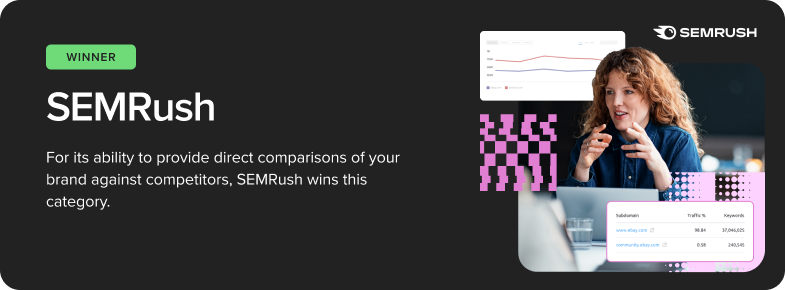
Tier we reviewed: 7 day trial; Pro plan starting at $140 /month

Overall verdict
SEMRush allows for direct comparisons against competitors, letting users analyze up to four keywords to identify gaps and as many backlink gaps. The SEMRush organic research section showcases user ranks against keywords, and allows users to come to their own conclusions with a direct look at the domain overview of competitors — complete with authority score, percentage of branded and non-branded keywords, intent split, competitor information, and more.

Tier we reviewed: No trial or free tier, paid starts at $129/month

Overall verdict
Ahrefs’ competitive section is less fleshed out compared to SEMRush, but it does compare keyword opportunities with competitors and perform competitive analysis of backlinks. The site explorer section provides additional insights into possible competitors, and the Brand Radar feature looks for mentions on AI and other search engines.
Best SEO tools for site audits
The best SEO audit tools help identify and fix technical issues that hinder website performance and improve user experience. These kinds of tools are especially critical for smaller teams without IT support watching for issues around the clock.
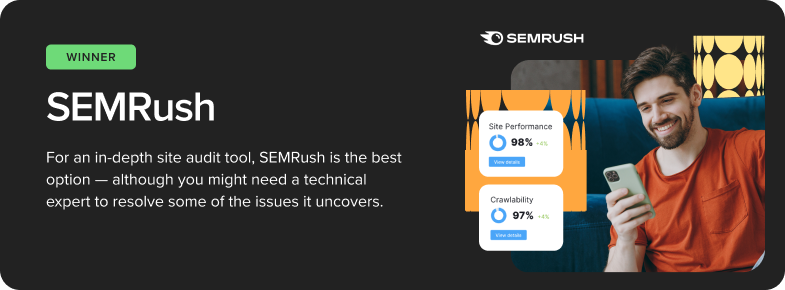
Tier we reviewed: 7 day trial; Pro plan starting at $140 /month

Overall verdict
SEMRush’s robust site audit tool covers many more elements than SERPstat. Its On-Page SEO checker uses competitive analysis to offer an exhaustive list of suggestions that can improve the organic performance of any site.

Tier we reviewed: 7 day trial; starts at $55/month

Overall verdict
The SERPStat tool contains an explicit site audit section that identifies technical and on-page SEO issues. It also offers actionable, user-friendly recommendations, even for people with varying levels of technical expertise — an important point for solopreneurs and small teams.
Best SEO tools for link building
An effective link building tool is highly valuable for small businesses, because building links from reputable sources attracts targeted traffic from visitors who are genuinely interested in your products or services. High-quality backlinks from reputable sites can also improve your domain authority and rank in local search results.
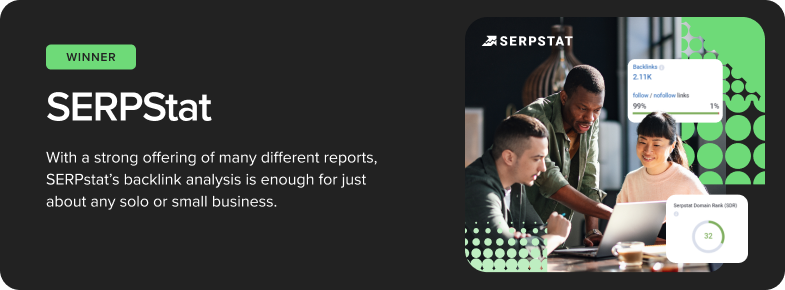
Tier we reviewed: 7 day trial; starts at $55/month

Overall verdict
SERPstat is a helpful tool for building links to your website, giving you reports that show who’s linking to you and where those links are coming from. It also helps you spot bad or harmful websites linking to you so you can choose to remove or block them. While you can’t manually mark a link as spam, it gives you lots of useful info to find good websites to reach out to — and enabling you to see where your competitors are getting their links.

Tier we reviewed: 7 day free trial; starts at $49/month

Overall verdict
Moz is a great tool for finding websites that might be worth reaching out to for links. It also shows you who’s linking to your site, what words they’re using in those links, and whether any of the links might be low quality or spammy. You can also see where your competitors are getting their links, which helps you find new opportunities to improve your own site’s visibility.
Best SEO tools for content optimization
Content optimization tools improve the speed, mobile-friendliness, and overall user experience people get on your site. Tools that optimize content effectively are a cost-effective way to help smaller businesses reach a large audience and build credibility and trust, especially compared to traditional paid advertising.
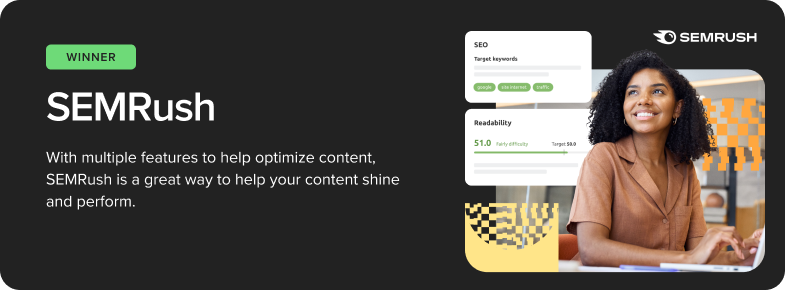
Tier we reviewed: 7 day trial; Pro plan starting at $140 /month

Overall verdict
The SEMRush SEO writing assistant helps you optimize content to rank higher in the SERPs, and you can use the SEO Content template to develop briefs that are search-ready. And although it’s a little harder for a novice user to master, the topic research section helps users generate ideas based on a seed keyword.

Tier we reviewed: No trial or free tier, paid starts at $99/month

Overall verdict
Although the SERP analyzer feature is unavailable in every tier of this tool, its specific utility for content optimization makes it a winner for this function. You can use the content editor feature to enter a seed keyword and write and edit content — although the tool can take longer than two minutes to generate suggestions.
Best SEO tools for reporting
Reporting tools allow small businesses to track progress, identify areas for improvement, and make data-driven SEO strategy decisions. The best of these tools can help users track user behavior and understand which content and keywords resonate with customers — because without good reporting tools, there’s is no reliable way to measure ROI on SEO strategy.
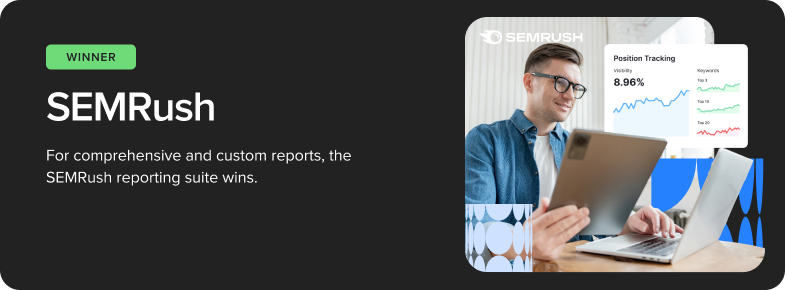
Tier we reviewed: 7 day trial; Pro plan starting at $140 /month

Overall verdict
SEMRush lets you create custom reports or use templates from Google Analytics 4 (GA4) and Google Search Console (GSC). It also allows integrations from social platforms, analytics platforms, lead gen platforms, email, ecommerce platforms, and even other SEO platforms. With this comprehensive tool, you can create almost any kind of report based on what you need to know.

Tier we reviewed: 7 day trial; starts at $55/month

Overall verdict
SERPstat was the best option in the trial suite. This tool offers a custom report that includes almost everything you’d expect in an SEO report, including traffic, keywords, competitors, and visibility. SERPstat also offers additional reporting capabilities through integrations with GA4, Looker Studio, Chat GPT, Python, R, and Google Sheets.
Best SEO tools for AIO and AEO optimization
These tools keep you one step ahead of your competition — because although many smaller businesses are still just trying to master traditional SEO, AI and answer engine optimization (AEO) are increasingly important, especially for reaching searchers who prefer voice search and AI-powered platforms.

Tier we reviewed: 7 day trial; Pro plan starting at $140 /month

Overall verdict
SEMRush delivers AI powered reporting, data gathers on AIOs, and AI powered keyword research abilities. The rest depends on what tier of the tool you’re using. For example, Tier 1 users can see their brand share in AI conversations and identify top areas for improvement. At the next level, Tier 2 users can compare how LLMs present them compared to their competitors, and get tips to strengthen their position. Tier 3 users can go further with customer sentiment analysis and AI optimized product and marketing tactics.

Tier we reviewed: 14 day trial; starts at $65/month

Overall verdict
The activities, interests, and opinions (AIO) research feature allows users to analyze competitors and their domains for presence and mentions in AI overviews. The AIO tracker treats the text and links of an AIO as a separate SERP and tracks your presence inside it. SE Ranking also lets you view the content of AI overviews by date, and provides SEO metrics for your keywords.
How we scored each section
To identify the best SEO tools, we first examined keyword data to determine which categories were searched for most. We paid special attention to those that are particularly relevant for a broad range of solopreneur and small business ventures — including optimizing site content, accounting for artificial intelligence (AI), and reporting capabilities to boost answer engine (AE) visibility.
Next, we scoured the web to create a long list of SEO tools appropriate for use cases that fall within these categories. The list included everything from comprehensive solutions like SEMRush and Ahrefs, to tools known for doing one thing well.
This led us to a shortlist of seven finalists. They included both free and paid tiers of SEMRush, SE Ranking, Moz, and SERPstat, and paid versions of Ahrefs, Surfer SEO, and SpyFu. We considered SEMRush and Ahrefs our “control” tools, as they’re proven across business sizes in the landscape, widely used by marketers and businesses, and highly regarded for search optimization.
Finally, we put all of the tools to a head-to-head test with multiple parts: keyword research, rank tracking, competitor analysis, site audit, link building, content optimization, reporting, and AI capabilities/answer optimization. We selected our top picks by evaluating performance for each category and comparing the scores with aggregated rankings on review sites.
The takeaway
In today’s competitive digital world, relying on guesswork isn’t enough to improve your website’s visibility. SEO tools give you real data about how people find your site, what keywords they’re using, and how your content stacks up against the competition. They also help you spot technical issues, monitor backlinks, and track progress over time — so you’re not just working hard, but working smart.
While no single tool can do everything, combining a few that fit your needs can give you a well-rounded view of your SEO efforts. From keyword research to site audits to link building, the right tools help you uncover opportunities and stay ahead of algorithm changes. Investing in SEO tools isn’t just about convenience — it’s about building a strategy that’s sustainable, measurable, and designed to grow with your goals.
It all starts with the perfect site for your traffic, so search for the right domain name with name.com. With that essential foundation laid, SEO tools like SE Ranking and SEMRush can help your business continually reach new heights.
Disclaimer: The information provided about tool limits is based on our own testing experience and may not reflect the exact limits for every user, region, or circumstance. Factors such as time of day, platform activity, or regional differences could result in varying user experiences.
